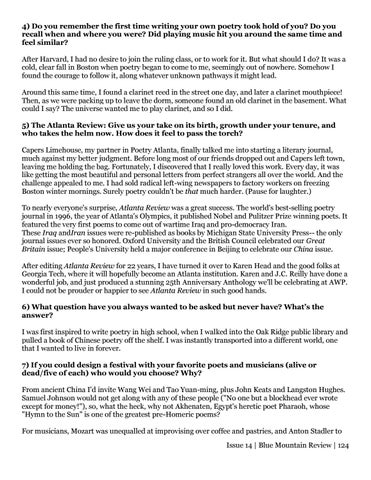4) Do you remember the first time writing your own poetry took hold of you? Do you recall when and where you were? Did playing music hit you around the same time and feel similar? After Harvard, I had no desire to join the ruling class, or to work for it. But what should I do? It was a cold, clear fall in Boston when poetry began to come to me, seemingly out of nowhere. Somehow I found the courage to follow it, along whatever unknown pathways it might lead. Around this same time, I found a clarinet reed in the street one day, and later a clarinet mouthpiece! Then, as we were packing up to leave the dorm, someone found an old clarinet in the basement. What could I say? The universe wanted me to play clarinet, and so I did. 5) The Atlanta Review: Give us your take on its birth, growth under your tenure, and who takes the helm now. How does it feel to pass the torch? Capers Limehouse, my partner in Poetry Atlanta, finally talked me into starting a literary journal, much against my better judgment. Before long most of our friends dropped out and Capers left town, leaving me holding the bag. Fortunately, I discovered that I really loved this work. Every day, it was like getting the most beautiful and personal letters from perfect strangers all over the world. And the challenge appealed to me. I had sold radical left-wing newspapers to factory workers on freezing Boston winter mornings. Surely poetry couldn't be that much harder. (Pause for laughter.) To nearly everyone's surprise, Atlanta Review was a great success. The world's best-selling poetry journal in 1996, the year of Atlanta's Olympics, it published Nobel and Pulitzer Prize winning poets. It featured the very first poems to come out of wartime Iraq and pro-democracy Iran. These Iraq andIran issues were re-published as books by Michigan State University Press-- the only journal issues ever so honored. Oxford University and the British Council celebrated our Great Britain issue; People's University held a major conference in Beijing to celebrate our China issue. After editing Atlanta Review for 22 years, I have turned it over to Karen Head and the good folks at Georgia Tech, where it will hopefully become an Atlanta institution. Karen and J.C. Reilly have done a wonderful job, and just produced a stunning 25th Anniversary Anthology we'll be celebrating at AWP. I could not be prouder or happier to see Atlanta Review in such good hands. 6) What question have you always wanted to be asked but never have? What’s the answer? I was first inspired to write poetry in high school, when I walked into the Oak Ridge public library and pulled a book of Chinese poetry off the shelf. I was instantly transported into a different world, one that I wanted to live in forever. 7) If you could design a festival with your favorite poets and musicians (alive or dead/five of each) who would you choose? Why? From ancient China I'd invite Wang Wei and Tao Yuan-ming, plus John Keats and Langston Hughes. Samuel Johnson would not get along with any of these people ("No one but a blockhead ever wrote except for money!"), so, what the heck, why not Akhenaten, Egypt's heretic poet Pharaoh, whose "Hymn to the Sun" is one of the greatest pre-Homeric poems? For musicians, Mozart was unequalled at improvising over coffee and pastries, and Anton Stadler to Issue 14 | Blue Mountain Review | 124
Issuu converts static files into: digital portfolios, online yearbooks, online catalogs, digital photo albums and more. Sign up and create your flipbook.
